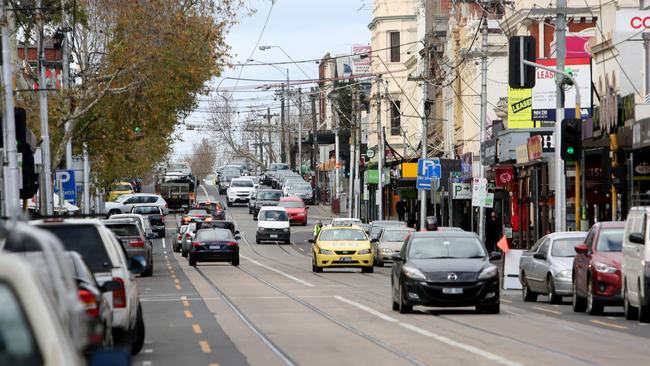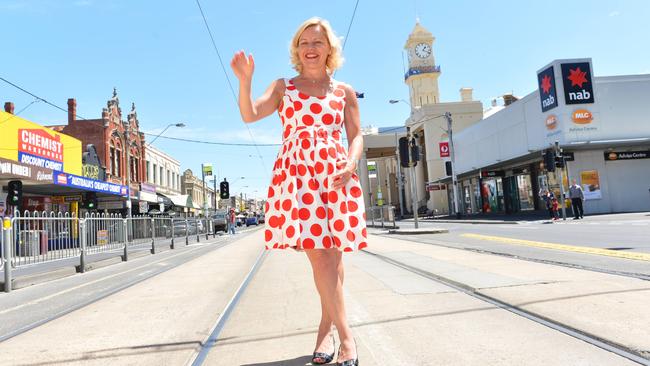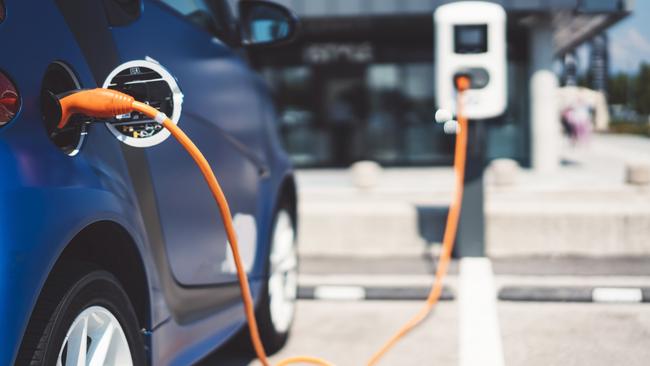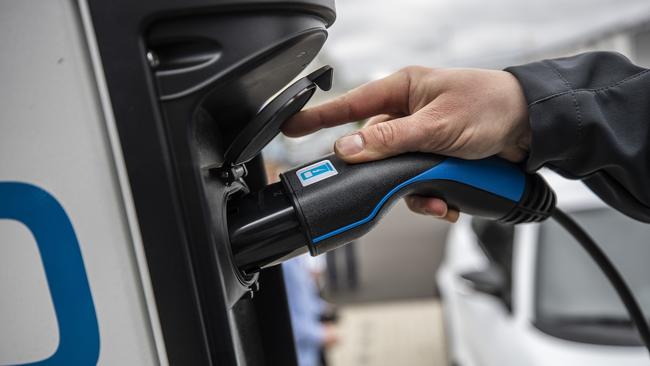Radical council plan to ‘discourage car ownership’ proposed
Fewer carparks at shopping strips, car-free zones and curfews could all hit inner Melbourne suburbs as early as next year, under the proposed Yarra Climate Emergency Plan. Here are the other potential overhauls.
VIC News
Don't miss out on the headlines from VIC News. Followed categories will be added to My News.
Parking spaces in popular Melbourne shopping and dining suburbs would be reduced, car-free zones and curfews introduced and ecowarriors engaged to preach to ratepayers of all ages about climate change, under a radical, new council plan.
The Yarra Climate Emergency Plan – affecting residents and businesses in Collingwood, Richmond, Fitzroy, Abbotsford, Burnley, Carlton North and Clifton Hill among other suburbs – seeks to make ratepayers use renewable energy sources and drive less.
If adopted, the 2020 to 2024 plan – costing ratepayers up to $3 million in its first year – will see council “remove incentives that preference car use and ownership” to encourage car sharing and “discourage car ownership”.

It would also see parking make way for improved public transport, more green space, wider footpaths and bike lanes.
Other initiatives in the plan include:
• Dedicating a pool of community grants to “community-led climate action”.
• Council partnering with childcare centres, schools and aged care services to spread the climate change message and encourage people to “lead climate action and advocacy within their circles of influence”.
• All Yarra council buildings to stop using gas.
• Public lighting across the municipality to be converted to the most energy-efficient technologies possible.
• Speeding-up residential solar panel installations and supporting businesses to move to 100 per cent renewable electricity.
• Council planners using their influence to help the municipality transition to zero-carbon buildings and precincts.
• Trial infrastructure changes including reallocation of car spaces, car free zones and curfews.
• Development of a parking management plan to reduce parking.

City of Yarra mayor Misha Coleman said the council was calling on residents, community organisations and businesses to have their say on the draft plan, which aimed to make the municipality completely emissions free as soon as possible.
“It’s our moral responsibility to respond to the climate emergency and the Yarra community has told us loud and clear that they want to be part of the solution. Our Climate Emergency Plan provides the tools to put that passion and energy into real action,” Cr Coleman said.
“Our draft Climate Emergency Plan is a turning point – we’re accelerating our own carbon emission reductions and, much more importantly, ramping up the ways we support our community during what really is a crisis.”

It comes as councils from Stonnington to Shepparton turn their car fleets green by replacing traditional sedans with hybrid and electric cars, and introduce charging stations throughout their municipalities for ratepayer use.
Greater Shepparton City Council chief executive officer Peter Harriott said his municipality
was just one of more than 40 Victorian regional and 11 metropolitan councils participating in a State and local government funded project assessing the feasibility and costs of providing public electric vehicle charging infrastructure.
HOW VICTORIAN COUNCILS ARE INVESTING IN ELECTRIC CARS
Environmentally conscious Victorian councils are turning their car fleets green by replacing traditional sedans with hybrid and electric cars.
Councils from Stonnington to Shepparton told the Sunday Herald Sun they were investing hundreds-of-thousands of dollars in low or no emission vehicles for employees to drive, and in electric car power charging stations throughout their municipalities for ratepayers to use.
Greater Shepparton City Council chief executive officer Peter Harriott said his municipality
was one of more than 40 Victorian regional and 11 metropolitan councils participating in a project assessing the feasibility and costs of providing public electric vehicle charging infrastructure.

Funded by the State Government and councils – and led by the Central Victorian Greenhouse Alliance – the Charging the Regions project also involves the Goulburn Broken Greenhouse Alliance, the Western Alliance for Greenhouse Action, the Eastern Alliance for Greenhouse Action and the Electric Vehicle Council of Australia.
The City of Melbourne, which has 15 electric vehicles in its fleet, said the cars were in line with its Emissions Reduction Plan but had also proven to be very cost effective.
“The energy cost per 100km is estimated to be $3.63 for the electric vehicle versus $15 for the fleet average,” a City Hall spokesperson said.
“Our average electric vehicle travels 1167km per week. We estimate that each electric vehicle in the fleet has saved us more than 31,000 litres of petrol and 71,457kg of greenhouse gases.”
MORE NEWS:
TRUE BENEFITS OF VICTORIA’S MAJOR EVENTS REVEALED
WITNESSES FLEE MID-INVESTIGATION WITHOUT CONSEQUENCE
WHY A PUBLICAN FACED-OFF WITH GANGITANO
Municipal Association of Victoria (MAV) president Coral Ross said while a number of councils had introduced electric vehicles into their fleet, there were still barriers preventing greater uptake.
“Research has shown that upfront costs and availability of suitable models, concerns about an inadequate charging station network and low consumer awareness are key barriers to increasing the transition to electric vehicles,” she said.
“Recognising the benefits of electric vehicles, it’s important for Commonwealth and State governments to work together to ensure appropriate policies and incentives are in place to accelerate uptake.
“Australia needs a wider variety of models at a lower price point to make them more accessible. There could also be more co-ordinated procurement of electric vehicles across Federal, State and local government.”
Here’s how 12 councils across the State are investing in electric cars:
CITY OF MELBOURNE:
• Nine Nissan Leaf EV passenger vehicles, purchased in 2012 for an average $37,000 each
• One Renault Kangoo light commercial vehicle leased in 2016 $60,000
• Four Hyundai Ioniq EV passenger vehicles, purchased 2019 $42,000 each
• One Nissan Leaf EV passenger vehicle, purchased in 2019 for $52,000 each
PORT PHILLIP:
• One Nissan Leaf at a capital cost of $34,000
• One Hyundai Ioniq at a cost of $47,000.
• In 2018/19 $40,000 was spent upgrading electrical infrastructure at St Kilda Town Hall and installing electric vehicle chargers to accommodate electric fleet vehicles.
• As the number of electric vehicles in the fleet increases, the infrastructure spend will also increase, with the current council plan being to spend $300,000 over three years (2019/20-2021/22) installing EV charging stations for the council fleet and public use.
STONNINGTON:
• One Nissan Leaf
• 15 hybrid cars currently and will have 19 by end of this financial year.
• One public charging station at Prahran Square Carpark
• Plans for council waste collection to be converted to hydrogen or electric powered
YARRA:
• Currently has “a number” of fully electric vehicles, bikes and the first electric tipper truck in Australia.
• Plan to transition the council’s entire car fleet pool and non-commuter vehicles to zero emissions by 2030.
• Planning dramatic expansion of electric vehicle charging points across private and public spaces within the municipality,
BRIMBANK:
• One electric car, a Hyundai Ioniq, which replaced a diesel Hyundai i30 in June this year.
• A 82KW ‘solar carpark’ and charging station are being installed at the Brimbank multi-deck carpark in Sunshine.
• Council’s ‘fleet transition plan’ to guide the introduction of electric vehicles is still in its early stages.
NILLUMBIK:
• Three Hyundai IONIQ hybrids, purchased last year.
• Planning to add electric vehicles to the fleet.
• Currently one public electric vehicle charging station at the Community Bank Stadium in Diamond Creek but preparing to install four electric vehicle charging stations at Nillumbik Council’s Civic Centre in Greensborough.
BOROONDARA:
• Currently no electric cars in council fleet but “looking at suitable options” following two car trials.
• There are three independently owned and operated charging stations available to the public in Boroondara, one at Camberwell Shopping Centre, one at Coles Headquarters in Hawthorn East and one at Rectifier Technologies in Burwood East.
DAREBIN:
• 60 per cent of Darebin Council’s passenger fleet is made up of either hybrid or electric vehicles.
• Two fully electric Hyundai Ioniqs were purchased this year.
• Plans for whole council fleet to be either hybrid or electric in the future.
• Previously purchased locally built cars including Holdens and Fords but with that option now limited the council has moved to an environmentally friendly focus.
• Two public electric vehicle charging stations have been installed at the Gower Street carpark.
• Plans to invest in infrastructure to support transition to all electric cars, buses and trucks by 2025.
GEELONG:
• Currently five hybrid cars, four Toyota Camrys and one Toyota Corolla.
• A further 19 hybrid Toyotas on order, including two Corollas, nine Camrys, eight RAV4s, to replace existing similar model petrol/diesel-fuelled vehicles.
• Plans to transition to a completely electric vehicle fleet over time.
•Electric car charging stations at Cunningham Pier in Geelong, the Leopold
Community Hub and the Armstrong Creek East Hub.
BALLARAT:
• No electric cars currently as council considers the expense is too great at this time but anticipates purchasing electric vehicles in the future.
• Nine hybrid cars, with another due to be delivered this month and three more expected by the end of the financial year.
BENDIGO:
• Two plug-in hybrid electric cars
• 12 hybrid cars and trucks
• Plans to move to more fully electric cars where feasible and possibly also electric trucks.
• There are 12 charging stations in Greater Bendigo, with two provided by the council
SHEPPARTON:
• Two Nissan Leaf 2E vehicles, with a combined value of $88,460
•The council has traditionally purchased and used hybrid vehicles in its pool passenger fleet
(Toyota Camry and Prius and Nissan Pathfinder) to minimise emissions. The electric vehicles
have replaced two Toyota Prius vehicles.
•Hoping to have a complete fleet of electric vehicles by 2023.
•Two 22kw Schneider Electric Vehicle Link Charge Stations have been installed and are
operational. Total cost of charge station purchase and installation was $21,570.
•A further three chargers are planned for the new Shepparton Art Museum, which is under construction.
